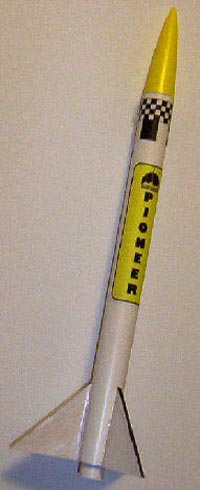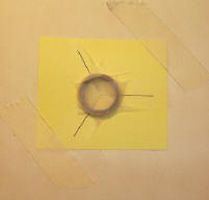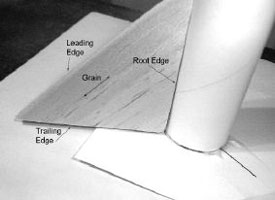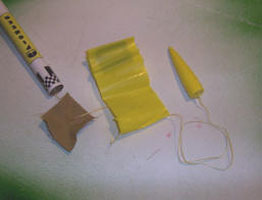| Construction Rating: | starstarstarstarstar_border |
| Flight Rating: | starstarstarstarstar |
| Overall Rating: | starstarstarstarstar_border |
| Manufacturer: | Pratt Hobbies  |
 Brief:
Brief:
The Pioneer is a single-staged model rocket aimed at educational groups.
Construction:
The Pratt Pioneer Kit Contains:-
- 1 nice white glassine coated body tube
- 3 pre-cut hard balsa fins
- 1 plastic nose cone. This is very well-made with minimal molding flash.
- 1 motor mount tube
- 1 paper thrust ring
- 2 paper centering rings
- 1 launch lug
- 1 square of Nomex heatshield
- 1 long piece of Kevlar string(shock cord)
- 1 fin jig (paper base and centering ring)
- 1 plastic streamer
 The Pioneer does not include a
clip; for my class Thrustline Aerospace standard clips were added to each kit.
Instructions are geared toward first-time builders. Everything is clear and
concise.
The Pioneer does not include a
clip; for my class Thrustline Aerospace standard clips were added to each kit.
Instructions are geared toward first-time builders. Everything is clear and
concise.
A novel approach is used to fin attachment- a paper template with a circle and three radiating lines has a centering ring glued into the center. This forms the fin jig. Then, it is taped to the work table by taping over the lines with clear tape.
The body tube is slipped upright over the centering ring, and the lines are used as guides to attach the fins. This gives the builder freedom to move on to other parts while the fins dry!
 The motor mount is assembled in normal
fashion, with one exception being shock cord attachment. The Kevlar®
string is tied to the front of the motor mount tube through a hole. The thrust
ring prevents it from being torn out by the force of ejection.
The motor mount is assembled in normal
fashion, with one exception being shock cord attachment. The Kevlar®
string is tied to the front of the motor mount tube through a hole. The thrust
ring prevents it from being torn out by the force of ejection.
There was one "gotcha" with my batch of Pioneers- the outside diameter of the motor mount tubes was too big to fit into the centering rings. Rather than attempting to peel away the inside of the centering rings to make them fit, I simply replaced them with some Totally Tubular MMT's that I keep handy. As these are standard MMT's and shorter than the Pratt items, I used the "lariat loop" method to retain the shock cord. A notch was cut into the outside of the front centering ring, and the cord tied around the tube. It was then glued in place. The notch allowed it to pass the centering ring without putting a crease in the tube.
The rest of construction is extremely easy and goes quickly. A couple of my students crushed their tubes (happens with every group), but the tubes didn't crinkle up. Hallelujah!!! I don't know what's in this paper, but we should be using it to build the Space Shuttle!
Finishing:
Finishing couldn't be easier. The white glassine tube readily accepts paint and ink, and the kits come with a good "Pioneer" logo sticker and a pretty nice roll pattern. The only part that really needs coloring are the balsa fins. My students decorated theirs with paint pens and markers. The rockets look sharp with the stock black, white, and yellow colors.
Construction Rating: 4 out of 5
Flight:
I've only got a single flight on the Pioneer. It's just been too cold to put
in a lot of time flying. After my students have their spring launch, I'll post
an update.

Prep is simple, just tape or clip in the motor, slip the Nomex® square into the tube, and roll up the streamer and push it onto the Nomex®. The remaining shock cord is slipped in and the nose cone installed. That's it! Add your ignitor and rack it.
My Pioneer was flown with a Quest A6-4. It took off fairly quickly on a very slightly curved trajectory. Altitude was decent; it looked to be about 3-400' to my "calibrated eyeball". This is impressive performer for sure.
Recovery:
The shock cord was attached as described. The Nomex® square has a hole in the center that slips down over the Kevlar® shock cord, and will nest down on top of the motor mount. The streamer is a 2" wide by 18" piece of yellow caution tape! It has a loop welded in one end which slides over the shock cord. Great way to dodge the typical attachment hassles, and it works like a charm. The other end of the shock cord ties to a very nicely molded loop in the nose cone.
The rocket had curved over to just about horizontal at apogee; ejection went flawlessly. The wide streamer unfurled pretty well and recovers the rocket at a decent speed. There was no apparent damage to the rocket on recovery other than a lot of soot on the shock cord, streamer, and the Nomex®. It remains to be seen how this stuff will stand up to repeated ejection charges, but so far, so good!
Flight Rating: 5 out of 5
Summary:My students had no problems building the Pioneer at all, even the 2 youngest (8 years old). These kits build faster than every other "builder's" kit I've ever tried. They are sturdy, and look good when completed. My limited experience suggests that they will be excellent performers overall. Price is VERY reasonable, you get a lot better rocket than some costing over twice as much.
The only "cons" are the motor tube fit (admittedly easy to rectify) and the lack of a motor hook. Some may view this as a plus- less weight and expense!
Overall Rating: 4 out of 5
Sponsored Ads
 |
 |











